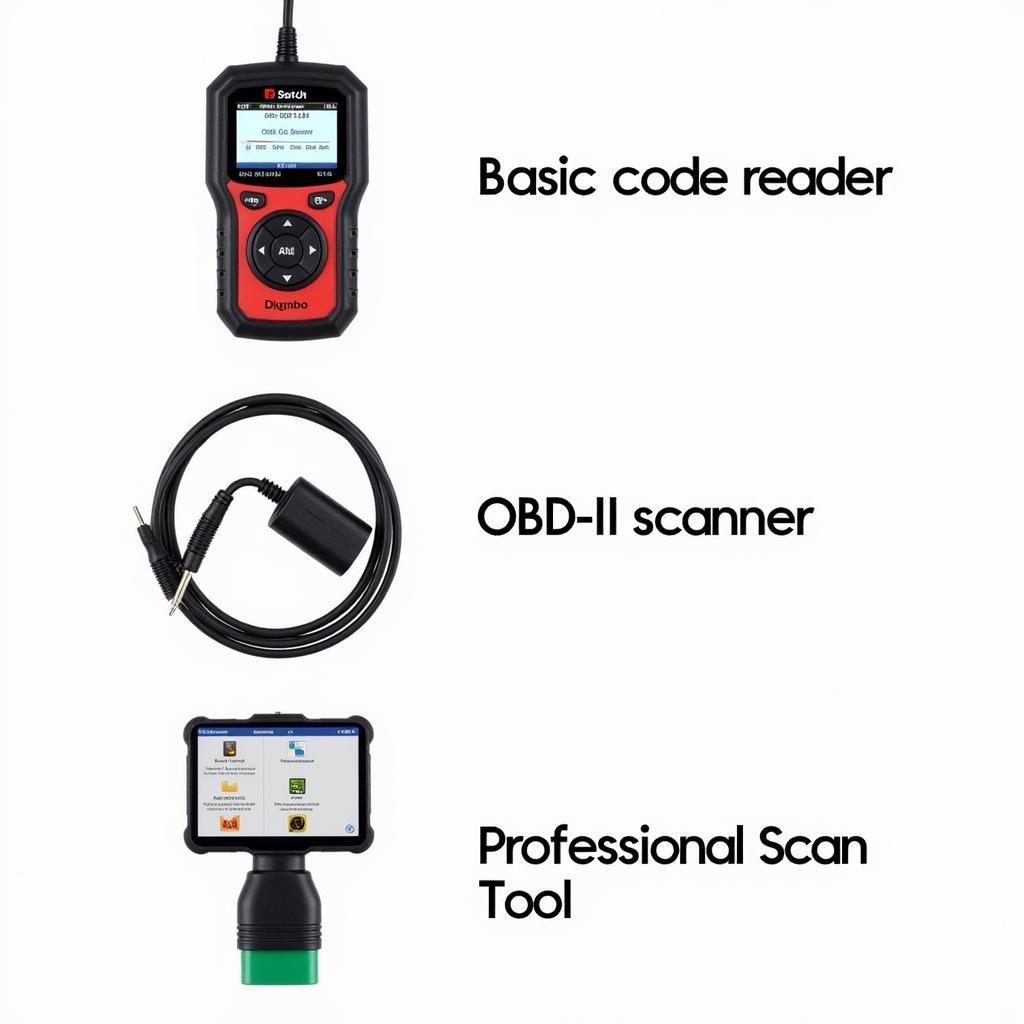A Car Diagnostic Device is an essential tool for any car owner or mechanic. Whether you’re a DIY enthusiast or a professional technician, understanding the nuances of these devices can save you time, money, and frustration. This guide will walk you through everything you need to know about choosing the right car diagnostic device, from understanding the different types to exploring advanced features and considering your budget.
Types of Car Diagnostic Devices
Car diagnostic devices come in a wide variety of forms, each catering to different needs and budgets. Understanding these distinctions is crucial for making an informed decision.
Basic Code Readers
These entry-level devices are perfect for reading and clearing basic diagnostic trouble codes (DTCs). They offer a simple solution for identifying common car problems. However, they often lack the capability to provide in-depth data or perform advanced functions.
OBD-II Scanners
OBD-II scanners offer more functionality than basic code readers. They can access more data from the vehicle’s onboard computer, including live data streams and freeze frame data, which provides a snapshot of the vehicle’s conditions at the time a fault code was stored. These scanners are a valuable tool for DIYers and mechanics alike.
Professional Scan Tools
Professional scan tools are the most advanced type of car diagnostic device. They offer comprehensive diagnostic capabilities, including bi-directional control, which allows users to activate various vehicle systems for testing purposes. These tools are typically used by professional mechanics and are essential for complex diagnostics and repairs.
After this introduction to the different types of devices, consider exploring our selection of car diagnostic devices.
 Types of Car Diagnostic Devices
Types of Car Diagnostic Devices
Key Features to Consider
Choosing a car diagnostic device involves more than just selecting a type. Several key features can significantly impact the device’s usefulness and effectiveness.
Compatibility
Ensure the device is compatible with your vehicle’s make, model, and year. Some devices are designed for specific vehicle manufacturers, while others offer broader compatibility.
Data Logging
Data logging allows you to record vehicle data over time, which can be invaluable for identifying intermittent issues or tracking performance trends.
Live Data Streaming
Live data streaming provides real-time access to various vehicle parameters, allowing you to monitor sensor readings and diagnose problems as they occur.
Bi-directional Control
This feature allows you to activate various vehicle systems, such as actuators and solenoids, for testing purposes. It’s a crucial feature for professional mechanics.
 Essential Car Diagnostic Device Features
Essential Car Diagnostic Device Features
Choosing the Right Device for Your Needs
The ideal car diagnostic device depends on your individual needs and budget. A basic code reader might suffice for a car owner who wants to perform simple diagnostics, while a professional mechanic would require a more advanced scan tool.
DIY Enthusiasts
For DIY enthusiasts, an OBD-II scanner like the obdeleven car diagnostics device offers a good balance of functionality and affordability. It allows you to read and clear codes, access live data, and perform some basic diagnostic tests.
Professional Mechanics
Professional mechanics need the advanced capabilities of a professional scan tool. These tools provide comprehensive diagnostic functionality, including bi-directional control and advanced coding options.
If budget is a concern, consider a cheap car diagnostic device to get started.
Conclusion
Choosing the right car diagnostic device is an investment in your vehicle’s health and your peace of mind. By understanding the different types of devices, considering key features, and assessing your individual needs, you can make an informed decision that empowers you to diagnose and address car problems effectively. Investing in a reliable car diagnostic device is a crucial step towards maintaining your vehicle and avoiding costly repairs. Consider exploring our recommendations for a fixed car diagnostic device for a reliable option.
FAQ
- What is a car diagnostic device?
A car diagnostic device is an electronic tool used to retrieve diagnostic trouble codes (DTCs) and other data from a vehicle’s onboard computer.
- What are DTCs?
DTCs are codes that indicate a specific malfunction within a vehicle’s systems.
- What is OBD-II?
OBD-II stands for On-Board Diagnostics, Generation II. It’s a standardized system used in most vehicles manufactured after 1996.
- Do I need a professional scan tool?
A professional scan tool is generally recommended for professional mechanics or advanced DIYers who require access to in-depth diagnostic functions.
- How much does a car diagnostic device cost?
The cost of a car diagnostic device can range from under $20 for basic code readers to thousands of dollars for professional-grade scan tools. You might also be interested in the fixd car diagnostic device.
- How do I use a car diagnostic device?
Most car diagnostic devices connect to the vehicle’s OBD-II port, which is typically located under the dashboard on the driver’s side.
- Where can I buy a car diagnostic device?
Car diagnostic devices can be purchased from auto parts stores, online retailers, and specialty automotive tool suppliers.
Need more help? Contact us via WhatsApp: +1(641)206-8880, Email: [email protected]. Our customer support team is available 24/7.

Leave a Reply